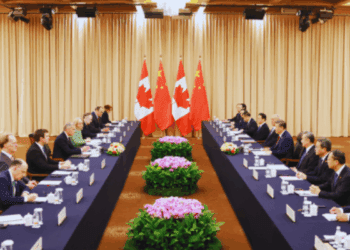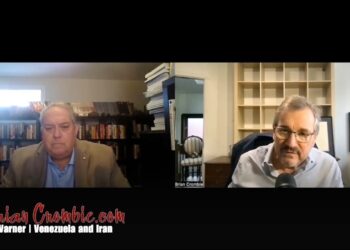The following is a transcript of Marcus Kolga’s testimony before the Canadian House of Commons Standing Committee on Public Safety and National Security. He discusses the issue of Russian cognitive warfare and the Kremlin’s threat to the Arctic.
The recording occurred on April 7, 2022. Please check against delivery.
By Marcus Kolga, April 7, 2022
Thank you, Mr. Chairman and members of the committee for inviting me to speak with you today.
My name is Marcus Kolga. I have worked very closely with the Russian pro-democracy and human rights movement for nearly 20 years. I led the civil society campaign for Magnitsky human rights sanctioning legislation and I’ve also been monitoring and writing about Russian threats, including information and cognitive warfare, for the past 15 years.
You’ve already heard much about Russian disinformation. I’d like to look more specifically at Russian cognitive warfare efforts targeting Canada and our allies and the threat of Vladimir Putin’s militarization and resource imperialism in the Arctic. I’d be happy to answer questions about the war in Ukraine, Putin’s broader objectives, sanctions and influence operations as well.
Russian information warfare is not a new phenomenon. The Soviets became experts at it during the Cold War. Vladimir Putin, who is a product of the KGB, restored cognitive warfare as a primary tool to repress his own people 20 years ago, using it to undermine western democracies and erode cohesion within the NATO alliance.
While some may still doubt the threat that Russian cognitive warfare poses to Canada, there is irrefutable evidence of it. Canada’s National Intelligence and Security Committee of Parliament has repeatedly warned about this persistent and growing threat in its annual reports.
Putin’s objectives in terms of cognitive warfare are mostly agnostic of any mainstream ideology, but it does align with his support for both far-left and far-right groups.
As we’ve heard, Russian information warfare targets socially sensitive issues in order to polarize us. Once those issues are identified, they are amplified by a complex Russian information laundromat that includes the weaponization of information through Russian state media and a constellation of proxy groups and platforms – including right here in Canada – that regurgitate this information, which is then further amplified by Canadian extremist groups on the far-left and far-right.
The objective of Russian information and cognitive warfare is to undermine and subvert our democracy through polarization.
We saw its impact during the 2016 US presidential elections. We also saw this throughout the COVID pandemic, where I warned in March 2020 that the Russian government would exploit the pandemic with anti-lockdown and anti-vaccination narratives.
Those anti-lockdown movements were injected with anti-government narratives. During the Ottawa trucker protests, we observed Russian state media exploiting the protests and protesters to legitimize and amplify fringe voices within it – for example, those who advocated for the violent overthrow of our democratically elected government.
The Ukrainian conflict has seen an intensification of Russian information operations around the world. Among Putin’s many false claims to justify his barbaric invasion is that Ukraine is a nation run by Nazis and that the Ukrainian nation needs to be eliminated. That same “Nazi” narrative has targeted Canadians of Ukrainian heritage – including Canadian elected officials, both Liberals and Conservatives, who support Ukraine. This is intended to delegitimize their status and voices as Canadian citizens and promote hate towards them.
Our research has demonstrated that Russian disinformation has directly targeted Canadian elected officials, including Stephen Harper and Justin Trudeau, and our geopolitical interests over the past years. This includes narratives intended to exploit and intensify negative emotional reactions to sensitive issues like residential schools, the environment and anti-LGBTQ issues – which are, again, tailored for both the far-right and far-left.
NATO and, of course, the Arctic have also been targeted.
In the Arctic, Russia has engaged in a rapid militarization over the past decade. This includes underwater nuclear super-weapons: torpedoes that can glide undetected underneath the ice to irradiate our Arctic coastlines. Dozens of nuclear icebreakers, airfields and specialized Arctic warfare bases have been established. The new high-tech Nagurskoye long-range bomber airfield is as close to Canada, as Winnipeg is from Ottawa.
Last year, Russia claimed all of the resources under the Arctic Sea. All of them. Right up to Canada’s 200-nautical mile Economic Exclusive Zone.
Indeed, Russia’s official 2035 Arctic Strategy calls for aggressive Arctic resource expansion and warns about a potential conflict in the Arctic, adding that the continuous militarization of the Arctic is required.
In conclusion, Canada failed to take the threat of Russia seriously on multiple occasions – 2007 in Estonia, 2008 in Georgia, 2014 in Crimea and Donbas, 2015 in Syria, 2016 in the United States and now in 2022 in Ukraine. Let’s not make the same dangerous mistake with the Arctic and Canadian democracy.
Marcus Kolga is a Senior Fellow at the Macdonald-Laurier and founder of DisinfoWatch.org.





